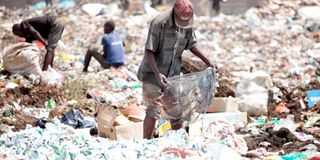Broken promises: Kisumu’s failed dream of a waste recycling plant

Kachok dumpsite in Kisumu which has for a long time been an eyesore to the city dwellers.
What you need to know:
- The dumpsite was moved in June 2022 to Kasese waste management site in Muhoroni Sub-county, with grand plans to rehabilitate the vacated land into a recreational garden and establish a modern waste recycling plant.
More than three years after the relocation of Kisumu’s infamous Kachok dumpsite, the county government’s plan of putting up a waste recycling plant remains but an empty promise.
The dumpsite was moved in June 2022 to Kasese waste management site in Muhoroni Sub-county, with grand plans to rehabilitate the vacated land into a recreational garden and establish a modern waste recycling plant.
But three years down the line, there has been minimal activity at the new waste disposal site, with locals now fearing that the site might just end up as the old Kachok dumpsite.
Water, Environment, Climate Change and Natural Resources Executive Judith Oluoch said the project has faced major delays as a result of challenges arising from public-private partnerships.
According to Ms Oluoch, the county is yet to find a potential bidder to put up a waste rehabilitation plant at the proposed site.
“The minister for Finance recently gave new guidelines which shorten the approval process of an investor,” said Ms Oluoch, adding that the county has since advertised an expression of interest on its website hoping to attract a potential bidder.
Ms Oluoch noted that a significant portion of the waste generated in Kisumu County is organic, ranging from 65 to 70 per cent. The remaining 30 per cent consist of plastics. The executive noted that while the organic waste can be utilised in production of fertilisers, the plastics can be recycled into a wide variety of valuable materials and products.
“Our hope is that Kisumu will soon get an investor who will be able to convert waste to value,” said Ms Oluoch.
Mr Kevin Odhiambo, a resident of Muhoroni, said their hopes of securing employment opportunities at the recycling plant have continued to fade each day.
He noted that the dumpsite is turning into a major headache for locals, who are forced to put up with foul smell whenever it rains.
“For the last three years, all we see are trucks emptying waste from the city,” said Mr Odhiambo.
In September 2022, the county government announced an invitation to tenders on development of the integrated waste management plant in Kasese.
The advertisement came three months after a successful relocation of Kachok dumpsite to Kasese.
The waste management plant, according to the county advertisement, would play a major role in processing and converting garbage to other environmentally friendly products such as fertilisers, interlock blocks from shredded glasses and plastics to make building materials.
The move is aimed at ensuring that waste does not pile up as had been experienced at Kachok dumpsite.
“The successful bidder will be required to design, build, finance, operate and maintain the waste management plant on a collaboration agreement basis as at an agreed concession period,” read the advertisement.
In an effort to tackle the growing garbage crisis, Ms Oluoch said the county has established six material recovery facilities. She also cited collaboration with waste collectors, women, and youth groups to ensure proper waste sorting before disposal.
The official further called on producers and manufacturers to align with the Extended Producer Responsibility as per the requirements of the integrated sustainable solid waste policy.
Ms Oluoch was speaking during a panel discussion organised by Haki ni Yetu, a consortium of three organisations namely Civil Society Organization Network, InformAction and KIOS Foundation on ending plastic use.
Systemic issues
According to Ms Winnie Masai, the executive director of InformAction, the event was aimed at unpackaging systemic issues exacerbating use of plastic despite the 2017 ban.
“Some of the emerging issues is that use of plastic is driven by poverty. The plastics tend to be easily accessible and cheaper,” said Ms Masai, adding that plastic waste threatens Lake Victoria, a key resource for local livelihoods.”
She added that Kenya's porous borders have facilitated the continued smuggling of plastic bags, even after a ban on single-use plastic bags was implemented. “while Kenya has strict regulations banning single-use plastics, the lack of similar policies in neighbouring countries has severely weakened enforcement, allowing banned plastics to flood back into the market through porous borders.”
Ms Masai called for sensitisation campaigns to educate the public on proper waste disposal.
Ms Betty Okero from CSO Network regretted that communities are resisting the plastic ban.
“We are currently dealing with conflict between community members who want to continue using plastics and a government that is working to enforce the plastic ban.”
But while biodegradable bags exist, they are more expensive than plastic, making them unaffordable for low-income traders and households.“We say waste is wealth, but where are the alternatives? The ones available are too costly,” said Ms Okero.

